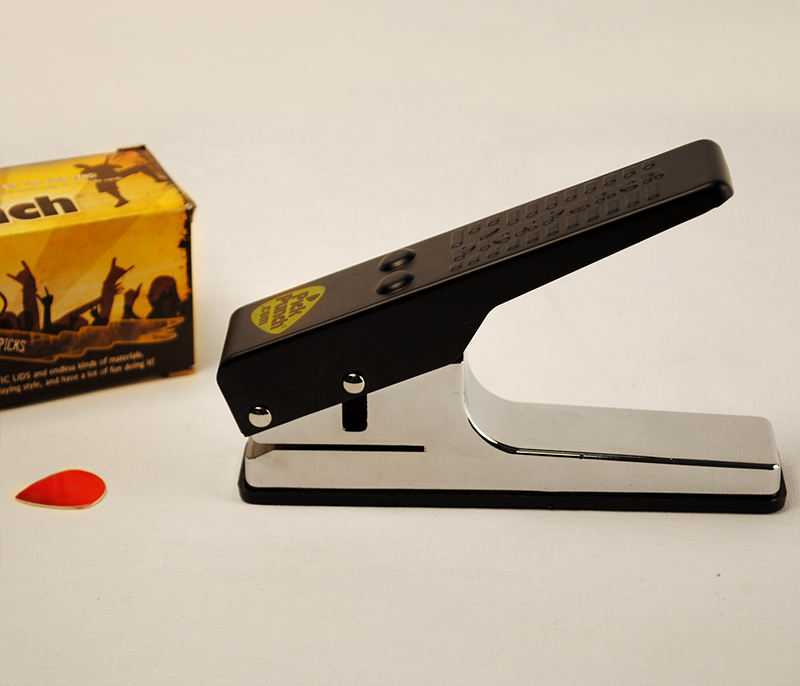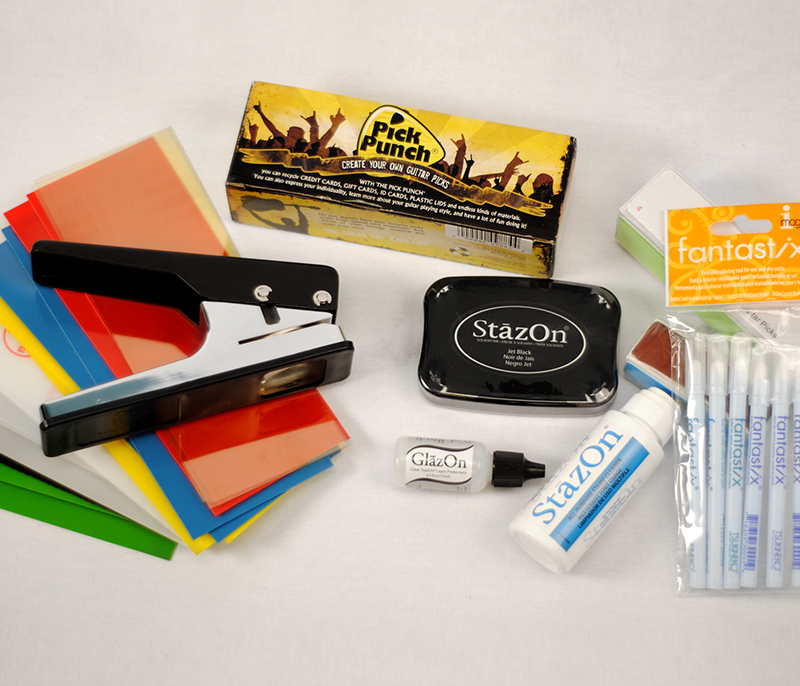2023 Pick Punch LLC - NEW ARRIVALS!! NAILED IT TOOL!! NEW PUNCHES: PRINTED PLASTICS!, NEW PICK ALBUM, TEARDROP, CIRCLE & SQUARE
NEW GIFTS available in ACCESSORIES: GUITAR PICK WALLETS, KEYCHAINS & HOLDERS
NEW GIFTS available in ACCESSORIES: GUITAR PICK WALLETS, KEYCHAINS & HOLDERS


Ultem sheeting. The best most expensive guitar pick material available. These sheets produce popular 0.50mm picks. Expensive but worth it. 12"X8" cut in to four equal strips.
*If you are not ordering a punch we can ship this sheet whole if you prefer.
These 12" X 8" Cut into four equal strips sheets will produce about (72 regular 351 picks) and (80 Jazz picks) depending on how careful and close you punch the picks out. We used this material to produce the new 1.10 Ultem embedded picks that we show in our How-To section. Get this material while we still have it. We may not carry it again because quite simply we don't make anything off of it. This is the stuff they use in the space industry.
Sorry about the price on this stuff everyone. We are working on getting better prices but this stuff is expensive even in bulk. We may not carry this material in the future so get it while we have it.
---------------------------------------------------
GENERAL INFORMATION ALL PICK MATERIALS:
Most common picks are made out of various types of plastic. Most popular plastics include:
Celluloid. Historically, this was the first plastic ever used to produce picks, and it is still of some use today, especially for guitarists aiming for vintage tone. Occasionally, guitarists who smoke have accidentally discovered the extremely flammable nature of this material.
Nylon. Popular material, has a smooth and slick surface, so most manufacturers add a high-friction coating to nylon picks to make them easier to grip. Nylon is flexible and can be produced in very thin sheets. Most thin and extra-thin picks are made out of nylon. However, nylon loses its flexibility after 1–2 months of extensive use, becomes fragile and breaks, so guitarists that use thin nylon picks should have several spare picks just in case.
Tortex / Delrex. By Jim Dunlop and D'Andrea Picks respectively. Brand names for DuPont Delrin which is specially treated to have a matte, opaque surface, surprisingly easy to grip even with sweaty fingers. Acetal. Acetal is a class of plastics, which is divided into two groups. The copolymer group, was first introduced by McAndrew Hoechst Celanese Corporation in 1960. Steve Clayton uses this branch for their line of Acetal picks. DuPont's (Wilmington, DE) Delrin developed and patented acetal homopolymer. Delrin is a Dupont trade mark/name. Dupont homopolymer acetal, is slightly harder, and stiffer than the copolymer branch. Both acetals have a matte surface for grip, and are highly durable.
Ultem. This space age plastic has the highest stiffness of all plastic picks. Produces a brighter tone. Introduced by Steve Clayton,Inc., the material is additionally popular among mandolin players.
Lexan. Glossy, glass-like, very hard surface, though it wears out relatively fast. Barely bends at all and it's commonly used only for thick and extra-thick picks (> 1 mm). Usually has a high-friction grip coating. Best known example of Lexan picks are Jim Dunlop Stubby series.
Modern plastics can be ranged this way from the easiest to bend to the hardest: Nylon, Acetal, Delrin (Tortex/Delrex), Lexan, Ultem. This means that the same medium (for example, 0.70–0.80 mm) pick would be fairly flexible if made out of nylon and very solid if made out of Ultem.
Source Wikipedia
*If you are not ordering a punch we can ship this sheet whole if you prefer.
These 12" X 8" Cut into four equal strips sheets will produce about (72 regular 351 picks) and (80 Jazz picks) depending on how careful and close you punch the picks out. We used this material to produce the new 1.10 Ultem embedded picks that we show in our How-To section. Get this material while we still have it. We may not carry it again because quite simply we don't make anything off of it. This is the stuff they use in the space industry.
Sorry about the price on this stuff everyone. We are working on getting better prices but this stuff is expensive even in bulk. We may not carry this material in the future so get it while we have it.
---------------------------------------------------
GENERAL INFORMATION ALL PICK MATERIALS:
Most common picks are made out of various types of plastic. Most popular plastics include:
Celluloid. Historically, this was the first plastic ever used to produce picks, and it is still of some use today, especially for guitarists aiming for vintage tone. Occasionally, guitarists who smoke have accidentally discovered the extremely flammable nature of this material.
Nylon. Popular material, has a smooth and slick surface, so most manufacturers add a high-friction coating to nylon picks to make them easier to grip. Nylon is flexible and can be produced in very thin sheets. Most thin and extra-thin picks are made out of nylon. However, nylon loses its flexibility after 1–2 months of extensive use, becomes fragile and breaks, so guitarists that use thin nylon picks should have several spare picks just in case.
Tortex / Delrex. By Jim Dunlop and D'Andrea Picks respectively. Brand names for DuPont Delrin which is specially treated to have a matte, opaque surface, surprisingly easy to grip even with sweaty fingers. Acetal. Acetal is a class of plastics, which is divided into two groups. The copolymer group, was first introduced by McAndrew Hoechst Celanese Corporation in 1960. Steve Clayton uses this branch for their line of Acetal picks. DuPont's (Wilmington, DE) Delrin developed and patented acetal homopolymer. Delrin is a Dupont trade mark/name. Dupont homopolymer acetal, is slightly harder, and stiffer than the copolymer branch. Both acetals have a matte surface for grip, and are highly durable.
Ultem. This space age plastic has the highest stiffness of all plastic picks. Produces a brighter tone. Introduced by Steve Clayton,Inc., the material is additionally popular among mandolin players.
Lexan. Glossy, glass-like, very hard surface, though it wears out relatively fast. Barely bends at all and it's commonly used only for thick and extra-thick picks (> 1 mm). Usually has a high-friction grip coating. Best known example of Lexan picks are Jim Dunlop Stubby series.
Modern plastics can be ranged this way from the easiest to bend to the hardest: Nylon, Acetal, Delrin (Tortex/Delrex), Lexan, Ultem. This means that the same medium (for example, 0.70–0.80 mm) pick would be fairly flexible if made out of nylon and very solid if made out of Ultem.
Source Wikipedia
Related Products:
 Pick Punch "JAZZ SHAPE"
Pick Punch "JAZZ SHAPE" $24.95







